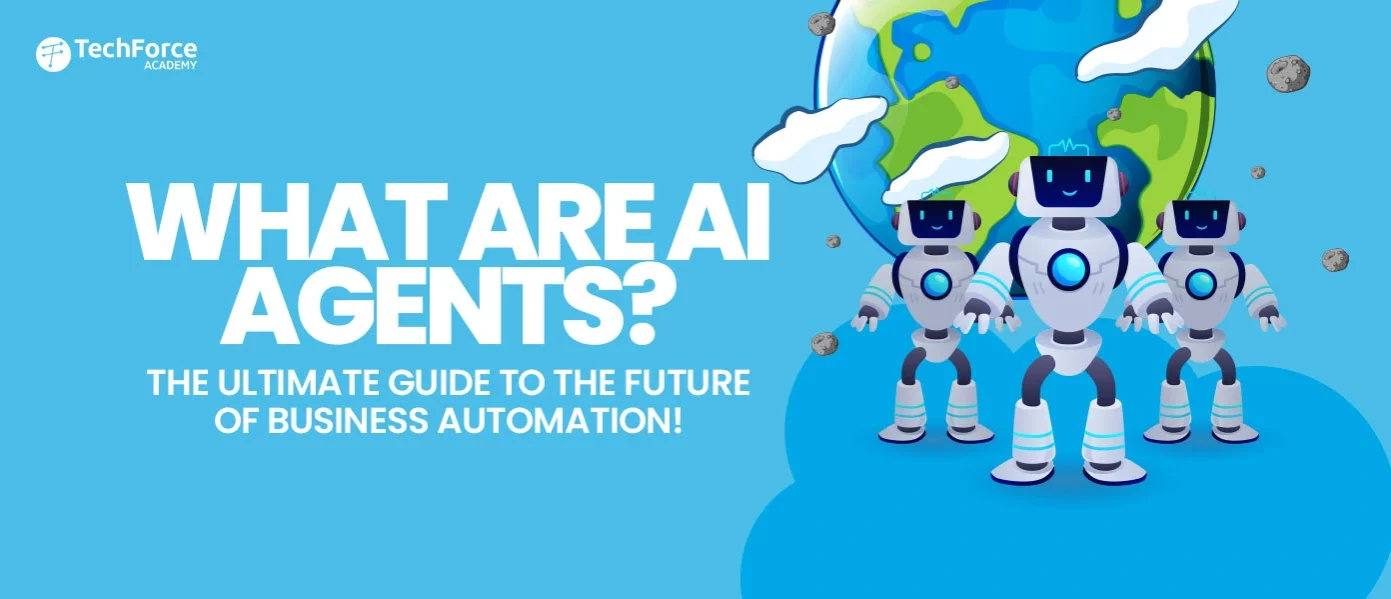AI agents are not just the future of customer service—they’re the key to unlocking unparalleled business efficiency and growth today. Imagine running a business where customer inquiries are answered in seconds, employees are free from repetitive tasks, and decision-making is backed by intelligent insights. This is not science fiction—this is the power of AI agents.
The fast development of artificial intelligence (AI) technology is causing changes in the industry, particularly with the creation of intelligent AI agents. These systems are automating tasks, improving customer service, and enhancing decision-making, all while saving time and money. Nowadays, more businesses are turning to AI agents to stay competitive and meet the increasing expectations of customers.
In this blog, we will look into the groundbreaking role of AI agents, explore their operation, and learn about the nature of employment in the future as businesses use these intelligent systems more and more. Let’s also look at how tools like Agentforce are already driving the next frontier of AI professionals.
What Are AI Agents?
At their core, AI agents are intelligent systems capable of comprehending customer inquiries and responding autonomously. They aren’t your average chatbots. AI agents use advanced technologies like machine learning (ML) and natural language processing (NLP) to understand, learn, and act upon data. AI agents are self-learning, in contrast to traditional AI systems.
These agents can handle complex tasks like answering detailed customer queries, processing requests, and providing recommendations, all while learning and improving their responses over time. These agents not only imitate but also improve human interaction.
Since routine queries don’t require human interaction, they free up team members to focus on more important activities. The combination of automation and personalization makes AI agents extremely powerful.
How Do AI Agents Work
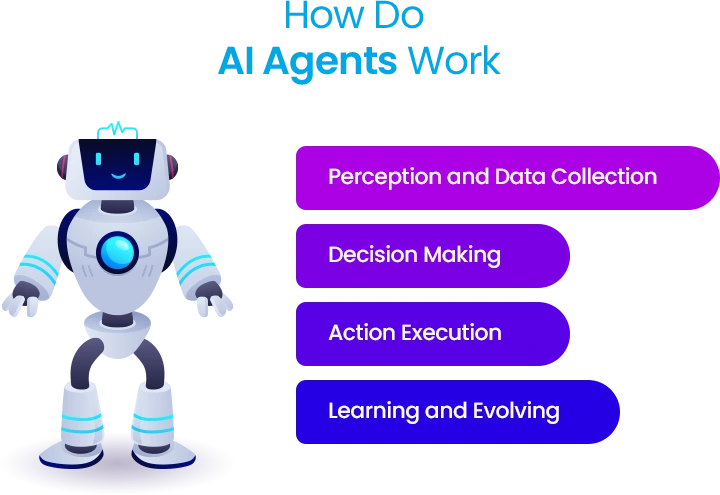
AI agents work in the following steps:
- Perception and Data Collection: AI agents start by compiling information from a range of sources, including social media interactions, transaction histories, and customer interactions. This data is the lifeblood of these agents. They analyze this information to understand where customer questions are coming from and anticipate needs.
- Decision-Making: AI agents utilize machine learning models to observe patterns and predict the best responses after gathering and processing data. They curate responses based on the specific context of the inquiry and past interactions. Response times are greatly reduced as a result, boosting client satisfaction and trust.
- Action Execution: Once the best response is determined, the AI agent executes the action. This might mean processing a customer request, providing information, or, in more complex cases, escalating the issue to a human agent.
- Learning and Evolving: The hallmark of an AI agent is its capacity to learn from every interaction. They continuously update their algorithms, refine their responses, and improve their performance.
The Evolution of AI Agents
AI agents were first developed as basic rule-based systems, created to carry out particular tasks in accordance with predefined rules. Artificial intelligence has developed throughout time into self-learning, autonomous agents that are increasingly capable of carrying out complex and subtle tasks. It improved efficiency and customer satisfaction
AI Agents vs. Chatbots: What’s the Difference?
Reactive Chatbots vs. Proactive AI Agents
While both AI agents and chatbots handle customer interactions, they operate on different levels of sophistication. Typically, chatbots operate according to pre-written scripts and offer responsive responses in reply to particular inputs. On the other hand, in addition to offering basic responses, an AI agent anticipates user wants, offers proactive solutions, and comprehends context.
Multitasking and Context Understanding
AI agents can juggle multiple tasks simultaneously. Unlike chatbots, which often struggle to move beyond simple inquiries, AI agents analyze past interactions and understand the broader context of customer needs. It allows them to offer more intelligent, personalized solutions.
Use Case Comparison
For example, a chatbot might help with tracking an order. An AI agent, on the other hand, could not only track the order but also analyze the customer’s past purchases, and offer tailored product recommendations. It can even foresee any follow-up questions. The customer experience has significantly changed since AI agents offer a smooth, comprehensive solution.
The Different Types of AI Agents
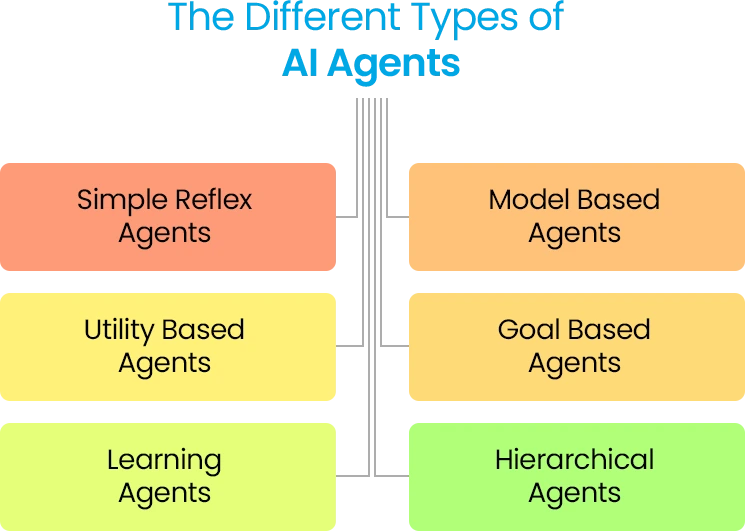
1. Simple Reflex Agents
These are the basic AI agents that respond instantly to specific stimuli. Think of them like a customer service chatbot—they follow preset rules to give a quick response based only on what they see or hear at that moment. However, they lack a deeper understanding of context, so they’re best suited for straightforward, repetitive tasks.
2. Model-Based Agents
These agents are a bit smarter. They build a model of the world around them, meaning they can interpret what’s happening, even when some information is missing. Their ability to understand the context of a situation enables them to make better-informed decisions. They work well in more complex settings when it’s not always easy to make the best choice.
3. Utility-Based Agents
These agents go above and beyond by using a utility function to assess and compare many options. They evaluate possible actions to choose the one that brings the highest benefit. For example, to choose the quickest and safest path to its destination, an autonomous vehicle would employ a utility-based agent.
4. Goal-Based Agents
These agents focus on achieving a specific goal. They analyze whether their actions will help them reach that objective and make decisions accordingly. Because of this, they work incredibly well in dynamic environments where a variety of factors need to be considered, like enhancing customer satisfaction or optimizing the sales process.
5. Learning Agents
Learning agents are like the ‘overachievers’ of the AI world. They get better over time, adapting and improving based on past experiences. Using reinforcement learning, they can learn from each interaction and fine-tune their responses. For instance, a virtual assistant might become more helpful the more it learns about a user’s preferences.
6. Hierarchical Agents
These agents operate with a clear structure, where higher-level AI agents oversee and direct lower-level agents. Each lower-level agent is responsible for completing a specific task, and together, they work toward a common goal.
Benefits of AI Agents: Why You Should Care
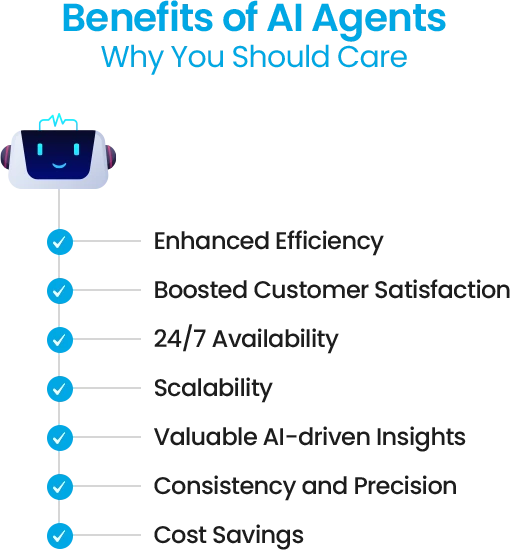
AI agents aren’t just a fancy tool—they’re a game changer for businesses across industries. Here’s why:
1. Enhanced Efficiency
Imagine handling hundreds, even thousands, of customer interactions simultaneously without missing a beat. AI agents are easily able to do this. AI agents thrive in this setting, enabling businesses to handle massive amounts of questions with reliable, high-quality responses. While human agents could find it difficult to deal with such volumes.
2. Boosted Customer Satisfaction
Quick, accurate responses make customers happy, and happy customers are loyal customers. AI agents leverage data to personalize each interaction, making customers feel seen and heard. These agents will gradually raise the bar for customer satisfaction as they continue to refine these interactions over time.
3. 24/7 Availability
The modern customer expects quick responses, no matter the time of day. AI agents work around the clock, ensuring that inquiries are handled even outside of business hours. Whether it’s a simple FAQ or a more complex issue, AI agents are there to assist—anytime, anywhere. This constant availability can greatly enhance customer loyalty and satisfaction.
4. Scalability
Whether your business is experiencing rapid growth or seasonal fluctuations, AI agents can scale with ease. They can seamlessly manage an increase in client encounters, making sure that no question is left unanswered. AI agents are a great choice for businesses looking to grow without compromising customer satisfaction due to their flexibility.
5. Valuable AI-driven Insights
AI agents do more than just respond to queries; they also gather and examine data from every interaction. This allows businesses to uncover trends, understand customer behavior, and make data-driven decisions. With the help of AI-driven insights, businesses can remain ahead of the curve by detecting commonly requested queries and forecasting future demands.
6. Consistency and Precision
AI agents always respond with accuracy and dependability. By reducing human error, they ensure each and every consumer receives accurate, consistent information. If you can consistently meet your customers’ needs, they will have more faith in you since they know they can rely on you to address their requests quickly.
7. Cost Savings
AI agents cut down the need for large human teams working around the clock. By automating repetitive operations, they provide scalable and inexpensive solutions, freeing up human workers to concentrate on higher-value work.
AI Agents Across Industries: Game-Changing Applications
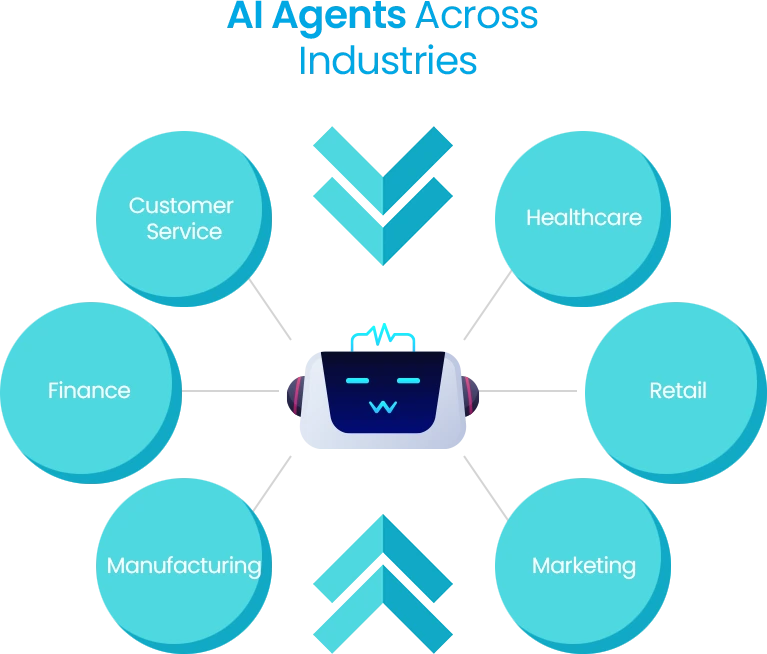
Customer Service
AI agents have revolutionized customer service by providing fast, personalized support around the clock. They reduce response times, improve accuracy, and enhance customer satisfaction.
Healthcare
AI agents help with patient management, diagnostics, and even predictive analytics in the healthcare industry. They support doctors in making data-driven decisions that enhance patient outcomes and care quality.
Finance
From fraud detection to personalized financial advice, AI agents in finance offer enhanced security and more tailored customer experiences. They look for unusual trends in transaction records and provide customers with cost-effective financial management guidance.
Retail
Retailers benefit from AI agents through product recommendations, inventory management, and customer service. By analyzing purchase patterns, AI agents can offer personalized shopping experiences that drive sales.
Manufacturing
AI agents predict maintenance requirements, automate repetitive jobs, and increase overall efficiency to optimize complex manufacturing processes. As a result, productivity is improved and downtime is decreased.
Marketing
AI agents are used in marketing to optimize campaigns through data-driven audience segmentation and behavior prediction. They ensure that, at the appropriate moment, the right message reaches the right people.
How AI Agents Improve Customer Experience
Hyper-personalization
AI agents excel at hyper-personalization. By analyzing customer data and preferences, they tailor their responses and recommendations, ensuring that each customer feels valued and understood.
Real-Time Decision Making
AI agents respond quickly and with context-appropriate information. This improves the general customer experience and shortens the time it takes to resolve customer complaints.
Cross-Channel Support
AI agents can seamlessly transition between digital and physical touchpoints. Whether a customer is interacting via email, social media, or in-store, AI agents ensure a consistent experience.
Emotional Intelligence
With advances in sentiment analysis, AI agents are increasingly capable of detecting intent and sentiment in customer interactions. This enables them to offer more empathetic responses, which improves customer satisfaction.
The Challenges and Ethical Considerations of AI Agents
Bias in AI
AI systems rely on data to learn, but if that data is biased, the outcomes will be biased too. Ensuring that AI agents are trained on diverse, fair data is critical to avoid perpetuating bias in customer interactions.
Data Privacy and Security
AI agents manage enormous volumes of private customer data. Any business that is using AI agents should place considerable emphasis on protecting customer privacy and ensuring the security of this data.
Technical Limitations
AI agents are strong, but they’re not flawless. Machine learning models are still limited by technical constraints, especially when it comes to understanding complicated human language or integrating with legacy systems.
Human Oversight
AI agents should not operate without human oversight. To make sure that AI agents are acting ethically, it is crucial to find a balance between human control and AI autonomy. Human-reinforced training helps AI gain confidence.
Real-World Case Studies: AI Agents in Action
Healthcare: Improving Diagnostics and Patient Management
AI agents have been instrumental in assisting healthcare professionals with diagnostics. For example, AI agents can examine medical data to detect possible health problems early on and improve patient outcomes.
Retail: Enhancing Personalized Shopping Experiences
Retailers like Amazon use AI agents to analyze customer behavior and provide personalized product recommendations. This not only improves customer satisfaction but also drives sales.
Manufacturing: Optimizing Production Processes
Companies like Tesla use AI agents to automate and optimize production processes. By predicting maintenance needs and managing workflows, AI agents help manufacturers reduce downtime and improve efficiency.
Finance: Enhancing Fraud Detection and Financial Planning
Financial institutions use AI agents to detect fraud by analyzing transaction histories for unusual patterns. Real-time fraud detection capabilities of these systems safeguard customers as well as businesses.
Best Practices for Implementing AI Agents
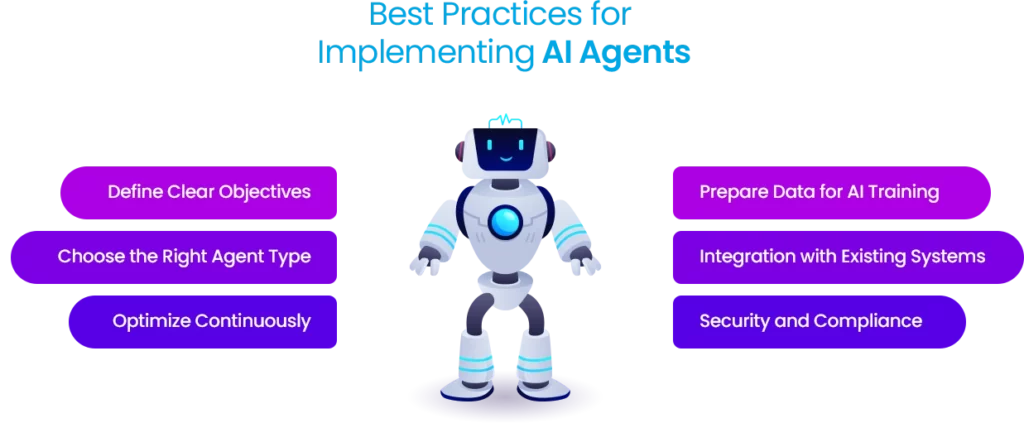
1. Define Clear Objectives
It’s essential to establish precise goals before deploying AI agents. What do you want to achieve with AI agents? Connecting AI agents with your business objectives is essential, whether those goals are cost-cutting or customer service enhancement.
2. Prepare Data for AI Training
AI agents rely on data to learn, so clean, structured data is crucial for training. For AI agents to perform better, make sure your data is well-structured and free of bias.
3. Choose the Right Agent Type
Different types of AI agents serve different purposes. For example, a simple reflex agent might be sufficient for handling basic inquiries, while a utility-based or goal-based agent might be necessary for more complex tasks that require decision-making based on multiple factors. Understanding the unique needs of your business will help you choose the right type of AI agent to deploy.
4. Integration with Existing Systems
A smooth integration ensures that your team has access to the data they need to work effectively and that they can quickly take advantage of the insights generated by AI agents. Tools like MuleSoft or Salesforce’s Service Cloud can help with this process. They can ensure smooth connectivity between your AI agents and other business systems.
5. Optimize Continuously
AI agents are not a set-it-and-forget-it solution. Like any other part of your business, they need continuous monitoring and optimization. Regularly collect feedback from customers and employees who interact with the AI agents to identify areas for improvement.
6. Security and Compliance
Verify that the AI agents you use are compliant with applicable data protection laws, such as the California Consumer Privacy Act (CCPA) and the General Data Protection Regulation (GDPR). Implement strong encryption protocols and conduct regular security audits to prevent breaches involving confidential customer information.
Collaborating with AI Agents
AI agents will become more and more important as businesses continue to incorporate AI into their operations. According to Paula Goldman, Salesforce’s Chief Ethical and Humane Use Officer, “The leap from generative AI to agentic AI will transform how humans work.” Goldman predicts that AI agents will not only handle mundane tasks but also play a more active role in decision-making and customer engagement.
Salesforce is setting the standard with the launch of Agentforce, a suite of AI-powered agents created especially for sales and support teams.
- Agentforce Sales Development Rep (SDR): This AI agent autonomously interacts with inbound leads, ensuring no opportunity is missed.
- Agentforce Sales Coach: This agent helps salespeople develop their skills by providing role-playing scenarios and feedback on sales conversations.
- Agentforce Service Agent: This agent, created for service teams, makes sure that customers always have access to assistance by offering 24/7 support via messaging platforms and self-service portals.
These AI agents represent the next frontier of business automation. They are more than just tools because they collaborate with human employees as team members to promote efficiency, creativity, and innovation.
Agentforce: The AI Agent Revolution Has Begun
Salesforce Agentforce is at the forefront of this AI agent revolution. By providing businesses with the tools they need to create and customize their own AI agents, Salesforce is empowering companies to take full advantage of this technology.
You can automate routine tasks, improve customer interactions, and gain valuable insights from every interaction with Agentforce. The objective of the future of work is to collaborate with intelligent systems like AI agents to help improve human skills rather than to replace humans.
Conclusion: The Time to Embrace AI Agents is Now
AI agents are not just a passing trend—they’re the future of business automation. They provide exceptional customer satisfaction, scalability, efficiency, and 24/7 availability, along with insightful AI-driven insights that can support business growth. As tools like Salesforce’s Agentforce continue to evolve, the possibilities for AI agents will only expand.
Whether you’re in sales, customer service, or any other sector, now is the time to start thinking about how AI agents can benefit your business.
The future is here, and it’s intelligent, automated, and ready to work for you.

